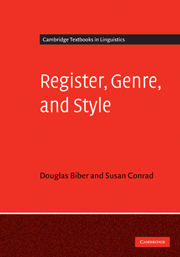Book contents
- Frontmatter
- Contents
- Acknowledgements
- 1 Registers, genres, and styles: fundamental varieties of language
- PART I Analytical framework
- Part II Detailed descriptions of registers, genres, and styles
- 4 Interpersonal spoken registers
- 5 Written registers, genres, and styles
- 6 Historical evolution of registers, genres, and styles
- 7 Registers and genres in electronic communication
- PART III Larger theoretical issues
- Appendix A Annotation of major register/genre studies (by Federica Barbieri)
- Appendix B Activity texts
- References
- Index
5 - Written registers, genres, and styles
Published online by Cambridge University Press: 05 June 2012
- Frontmatter
- Contents
- Acknowledgements
- 1 Registers, genres, and styles: fundamental varieties of language
- PART I Analytical framework
- Part II Detailed descriptions of registers, genres, and styles
- 4 Interpersonal spoken registers
- 5 Written registers, genres, and styles
- 6 Historical evolution of registers, genres, and styles
- 7 Registers and genres in electronic communication
- PART III Larger theoretical issues
- Appendix A Annotation of major register/genre studies (by Federica Barbieri)
- Appendix B Activity texts
- References
- Index
Summary
Introduction
In this chapter we turn our attention to three commonly encountered general written registers – newspaper writing, academic prose, and fiction. A fundamental difference between the spoken registers in the last chapter and written registers concerns time for planning and revising. Of course, you can choose to write a quick note, or you can even write a quick academic paper (perhaps with disappointing results when you get the grade!). Unlike speech, however, writing allows you to sit and think about what you want to say, look over what you have written, and revise it. As we shall see, these characteristics have important consequences for the language of written registers generally. But writers can also choose to use their planning and revising time to create very different kinds of texts, and this chapter also illustrates some of the variation that exists among different written registers.
One major situational characteristic shared by many written registers is a primary focus on communicating information rather than on developing a personal relationship. Of course, there are few uncontestable “facts,” and so most communication – in writing or speech – reflects some ideological perspective. Further, it is possible in writing to be interpersonal, and registers like personal letters or e-mail messages can be focused more on sharing personal feelings and attitudes than conveying information.
- Type
- Chapter
- Information
- Register, Genre, and Style , pp. 109 - 142Publisher: Cambridge University PressPrint publication year: 2009
- 1
- Cited by

